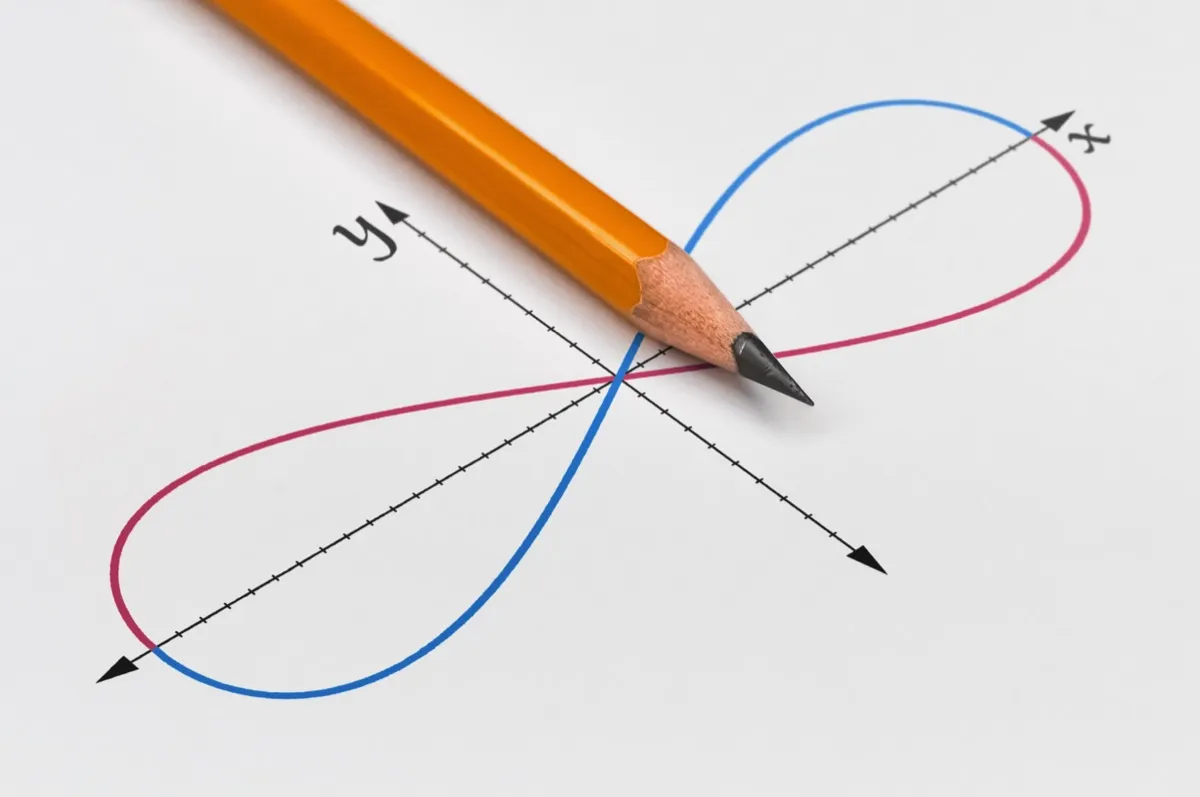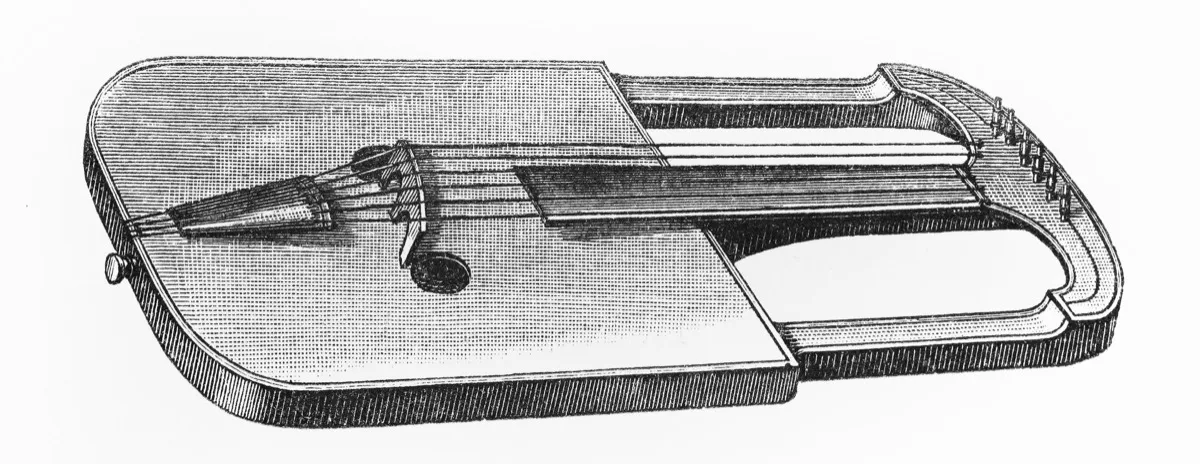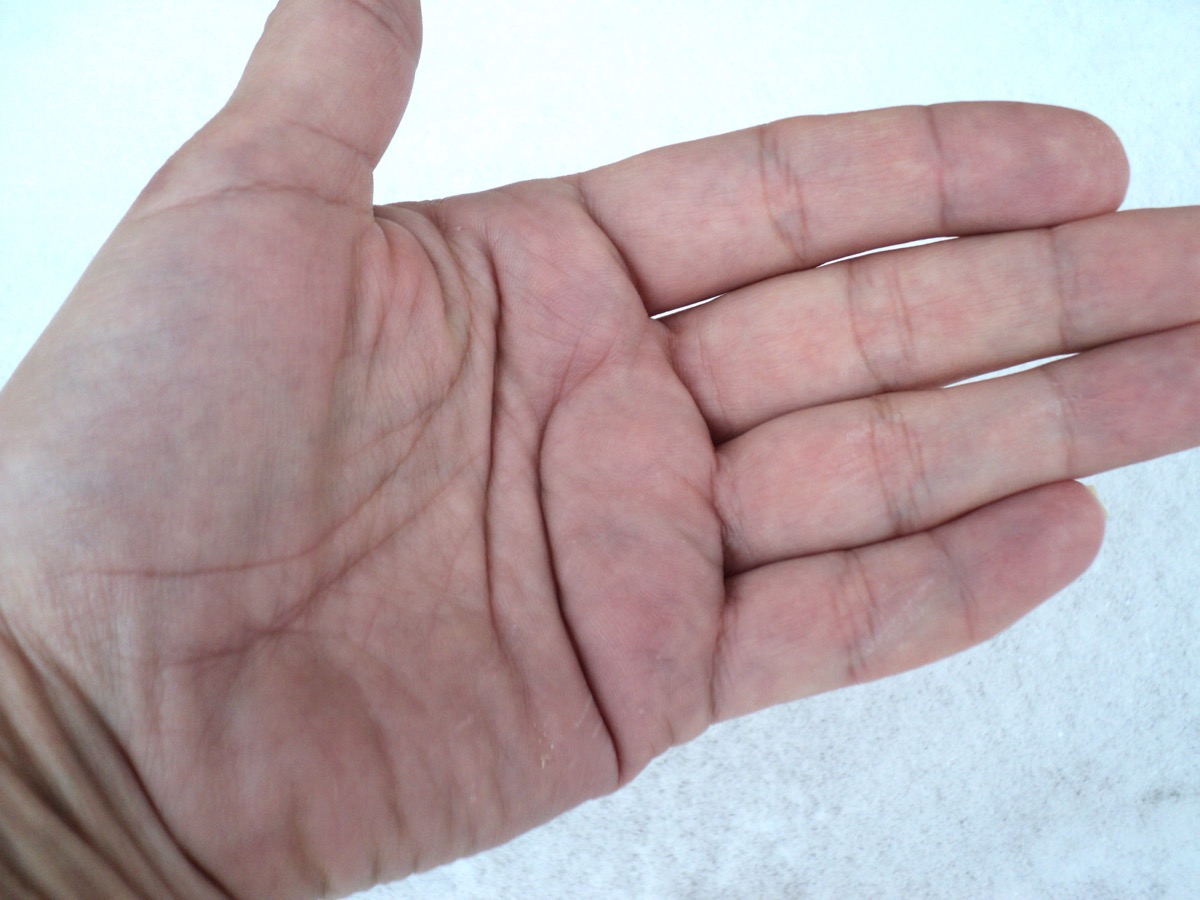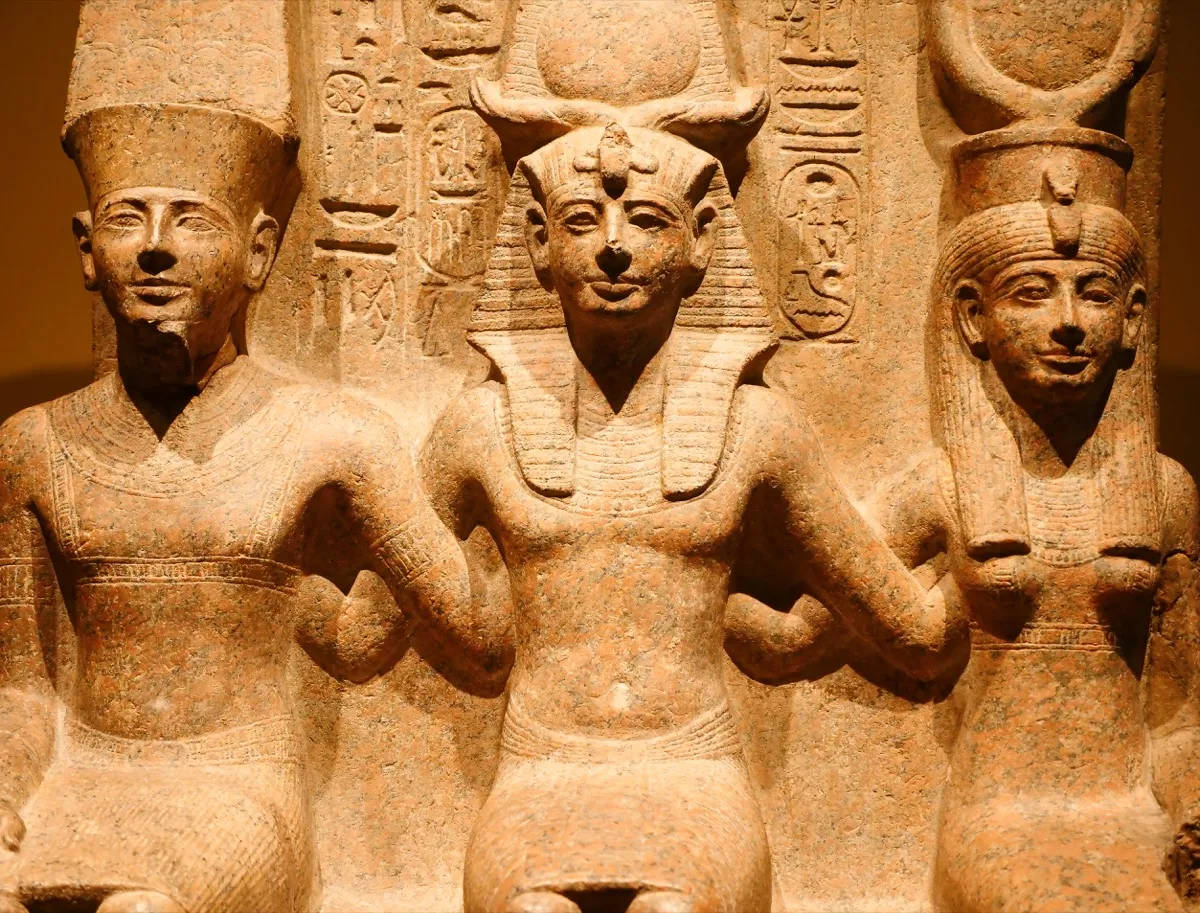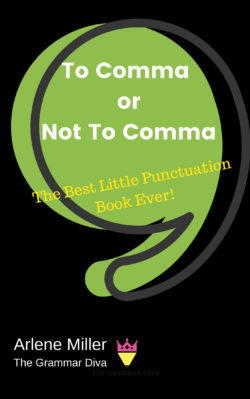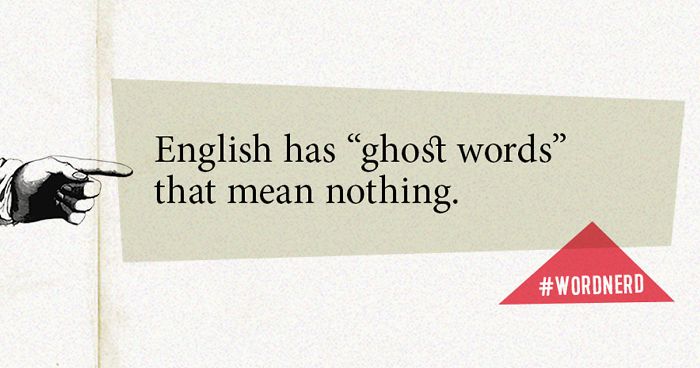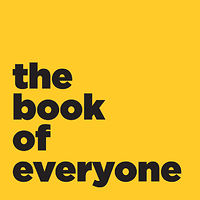Fun facts about words and the English language
The stuff of literature is, of course, words. As Samuel Taylor Coleridge observed, ‘Prose = words in their best order; – poetry = the best words in the best order.’ In this post, we’ve gathered up 27 of the best facts about words that we’ve unearthed since beginning this blog a couple of years ago. Where necessary, we’ve provided a link to further information.
If you enjoy these weird and wonderful word facts, you might also like our 10 rare but useful words everyone should know.
The word ‘onomatomania’ means ‘intense mental anguish at the inability to recall some word or to name a thing’.
A ‘dysphemism’ is an unpleasant or derogatory word or expression substituted for a pleasant or inoffensive one; the opposite of a euphemism.
Though of uncertain origin, the word ‘bad’ may stem from the Old English ‘bæddel’ meaning ‘hermaphrodite’ or ‘effeminate or homosexual man’.
The first recorded use of ‘bad’ to mean ‘good’ is from an 1897 book, Pink Marsh, by American writer George Ade.

‘Pristine’ originally meant primitive.
To ‘scan’ originally meant to study closely.
To ‘peruse’ originally meant to use up or exhaust.
‘Epizeuxis’ is the repetition of a word or phrase in immediate succession, e.g. the line from King Lear: ‘Never, never, never, never, never.’
A sentence containing a single word is a ‘monepic’ sentence.
Hippopotomonstrosesquippedaliophobia is the fear of long words. (We have more facts about long words in literature here.)
‘Word-grubber’ was 18th-century slang for someone who used unnecessarily long and complicated words in conversation.
‘Hellenomania’ refers to the act of using long Latin and Greek terms instead of readily understandable English words.
Samuel Johnson left the letter X out of his dictionary, claiming that X ‘begins no word in the English language’.
‘Aardvark’ isn’t the first word in the dictionary – the Oxford English Dictionary lists several words before it including a, aa (a stream), aal (a mulberry), aam (an old unit of liquid measure), aandblom (a wild flower), and aapa (a term, originating in South Asia, for an older sister).
Ezra Pound coined the word ‘logopœia’, which he defined as ‘the dance of the intellect among words’.
A ‘logodaedalus’ is someone who is cunning with words; it was first used by Ben Jonson in 1611.

‘Logamnesia’ means the act of forgetting a word.
‘Loganamnosis’ refers to the mania for trying to recall a forgotten word.
‘Logomisia’ denotes a disgust for certain words.
‘Logodaedaly’ refers to the arbitrary coining of new words.
C. S. Lewis coined the word ‘verbicide’ to denote the killing of a word or the distortion of its original meaning.
Richard Lederer coined the word ‘verbivore’ to describe someone who devours and feasts on words.
‘Verbigeration’ is the habit of frequently repeating favourite words or expressions.
The word ‘epeolatry’ means ‘the worship of words’; it first appears in an 1860 book by Oliver Wendell Holmes Senior.
Logan Pearsall Smith coined the word ‘milver’ for ‘a person with whom one shares a strong interest in a particular topic; esp. wordplay’.
More interesting word facts can be found in our interesting lexicon series, which examines the curious origins of well-known words.
Image (bottom): Multi-volume Latin dictionary (photo by Dr Marcus Gossler, 2005), Wikimedia Commons.
Words are the building blocks of communication—but still, there’s a lot you probably don’t know about them. Even some of the most common words have surprising histories or hidden meanings. And at the same time, the English language is loaded with words that perfectly describe everyday things, but chances are that you don’t use them because you never even knew they existed. That is, of course, until now. Here are 40 wild word facts that will add flavor to your future conversations—and maybe even help lead your team to victory at your next trivia night.
The term refers to a plane curve in which two loops meet at a central point, creating what we might call a sideways figure-eight. As Merriam-Webster explains, it’s derived from the Latin word for «with hanging ribbons.»
That would be the chemical name of Titin, the largest known protein. It begins, «Methionylthreonylthreonylglutaminylalanylprolylthreonylphenylalanylthreonylglutaminylprolylleucylglutaminylserylvalylvalylvalylleucylglutamylglycylserylthreonylalanylthreonylphenylalanylglutamylalanylhistidylisoleucylserylglycylphenylalanylprolylvalylprolylglutamylvalylseryltryptophylphenylalanylarginylaspartylglycylglutaminylvalylisoleucylserylthreonylserylthreonylleucylpro» and goes on for tens of thousands of letters. (You can read the whole thing yourself here and hear it pronounced here.)
The word, pneumonoultramicroscopicsilicovolcanoconiosis, technically refers to a type of lung disease caused by silica dust. But according to Lexico, it was actually coined in the 1930s by Everett M. Smith, the president of the National Puzzlers League, for the express purpose of becoming the longest word in the English language, so it’s a bit of a cheat.
According to the Online Etymology Dictionary, the word «bankrupt» grew out of an Italian phrase that literally refers to breaking something—not just the bank. That Italian phrase is banca rotta, meaning «broken bench,» and it refers to an old custom that involved literally breaking the bench of money dealers who ran out of funds.
Pancakes, corn flakes, coffee, orange juice—they are all «jentacular,» or «pertaining to breakfast.» Impress your friends next time you’re at brunch by declaring, «These scrambled eggs are such a great jentacular dish!»
In the late 19th century, pharmaceutical company Bayer released a revolutionary over-the-counter drug that could allegedly help everything from sore throats to tuberculosis. That drug was heroin. Its name comes from the German word heroisch for «powerful»—which is appropriate, given how powerful the addictive substance is. For a while, Bayer owned trademark rights to heroin, but they lost those rights in the Treaty of Versailles in 1919, according to the BBC.
Of course, the plural «confetti» is the more commonly used word, but you can use the singular «confetto» to refer to each individual piece of colored paper.
Think that’s cool? Here are some other awesome ones:
Western Union = No Wire Unsent
Clint Eastwood = Old West Action
Astronomers = Moon starers
Where does the name «walrus» come from? Well, on Oxford University Press’s blog, Podictionary host Charles Hodgson notes that it is derived from the Old English word horschwael, which literally translates to «horse whale.» Hodgson theorizes that this word was eventually flipped to create waelhorsch, and later, the similar-sounding «walrus.»
According to Merriam-Webster, the name of this flightless bird comes from the Welsh words for «head» (pen) and «white» (gwyn). It originally referred to the now-extinct great auk bird, but was eventually applied to these adorable Arctic-dwelling creatures—even though their heads are usually black and their bellies white.
It would seem that these two words would share some kind of common ancestor, but in fact, they grow from two completely different roots. While «adult» comes from the Latin verb adolescere, or «to grow up,» the word «adultery» grows from the Latin verb adulterare, which means «to commit adultery» or «to corrupt.»
Believe it or not, there are two five-letter words in the English language that contain zero vowels: «crwth» and «cwtch.» According to the Collins English Dictionary, both of these words are Welsh, and this language treats the letter «w» like a vowel.
When it’s Thursday and you’re trying to remind someone of something that happened on Tuesday, you usually go with the clunky phrase «the day before yesterday.» But guess what? There’s a one-word way of saying that: «nudiustertian.» Of course, given the time it will take you to explain to your friends what the word means, it might be easier just to say «the day before yesterday.»
According to the Online Etymology Dictionary, the word «ambulance» is rooted in the Latin word ambulare, meaning «to walk.» It might seem counterintuitive—don’t you need an ambulance when you can’t walk to get emergency assistance?—but the word originally referred to the contraptions known as «walking hospitals.»
As MedicineNet explains, in the 19th century, Napoleon came up with the idea of retrieving injured soldiers on a cart and running them out of harm’s way. The mobile unit used to transport soldiers was called a hopital ambulant, or a «walking hospital.»
George Clinton may be the godfather of funk (the music), but the word was around long before. According to Babbel, it originated in 16th century Europe to describe the unpleasant or musty smell of tobacco omnipresent at the time. It likely grew from the Old French word funkier, meaning «to blow smoke on.»
While we usually think of «bogus» as an adjective describing something fake, the word actually began as the name of a type of machine. As Merriam-Webster notes, a «bogus» was a machine that would produce counterfeit coins. Over time, the word came to serve as shorthand for «counterfeit» itself.
We’re all familiar with the concept of déjà vu: the feeling that we’ve experienced something before, even though it’s the first time we’re experiencing it. But what about jamais vu? This is the French term for the exact opposite phenomenon, in which something familiar feels foreign. Translating to «never seen,» it’s a phenomenon that can be caused by medical issues like epilepsy.
When someone or something is a leader and innovator in their respective field, they’re like a sheep leading the pack. At least, that’s what the person who first used the word «bellwether» to describe a leader was trying to say.
Centuries ago, it was commonplace for shepherds to hang bells around the «lead sheep» in their flock, which they referred to as the—you guessed it—»bellwether.» According to Merriam-Webster, the word began being used to describe a trendsetter in the 13th century.
That would be «hydroxyzine,» and it refers to a type of medicine that helps with both sneezing and anxiety.
In his epic poem Paradise Lost, John Milton invented the word «Pandemonium» as the name of the capital of the underworld. Stemming from the Greek words for «all» and «little spirit/demon,» the term roughly translates to something like «place for all demons.» When we use the word today, it usually refers to a kind of chaos, but Milton invented the word to describe a truly unpleasant-sounding place.
The word «algorithm» actually dates back to the 9th century. According to NASA, it’s derived from the latinization of the name of Persian mathematician Muhammad ibn Musa al-Khwarizmi, one of the founding fathers of algebra. It originally referred to «the system of Arabic numerals,» but over time, the term grew to broadly describe a set of rules to follow in making calculations.
As the Online Etymology Dictionary notes, the word «quarantine» comes from the Italian words quarantina giorni, which literally translate to «space of 40 days.» Why? In the 14th century, that’s how long ships were kept in isolation—or quarantined—when they could potentially be harboring sick passengers.
According to Lexico, they are «uncopyrightable»—something that cannot be copyrighted—and «dermatoglyphics»—the study of skin markings. These two words are tied as the longest English words that don’t repeat a letter.
«Apron» traces back to the Latin word mappa for napkin, becoming «napron» in the 14th century. But over time, through a process called «misdivision» or «rebracketing,» the phrase «a napron» became «an apron,» eliminating the «n» and giving us the spelling we know today.
«Nickname» is another classic case of misdivision. According to the Online Etymology Dictionary, it was originally «ekename,» but in the mid-15th century it somehow became «neke name.» The «eke» comes from the Old English word eaca for «increase»—which makes sense when you consider that a nickname is an additional name.
When you walk out of the house and run into your neighbor, feel free to call them a «qualtagh.» Though that might sound like an insult, it actually just refers to the first person you see after leaving your house. Alternately, it can refer to the first person who enters your home after New Year’s.
A «contronym» is any word with two opposite and seemingly contradictory meanings. Examples of contronyms are «cleave» (which can describe both the act of dividing something and an object adhering to a surface) and «sanction» (which can describe both a punishment for disobeying the law and permission to do something).
According to Guinness World Records, this verb—and sometimes noun—has the most meanings of any English word, with 430 listed in the Second Edition of the Oxford English Dictionary. It also has the longest dictionary entry at 60,000 words!
It’s a question most people have at some point while working out: Why are dumbbells called «dumbbells»? Well, as Hodgson explains on the Oxford University Press blog, the word «dumbbell» comes from the fact that the exercise equipment was originally made by attaching silent metal bells to rope. You see, before the word «dumb» meant «stupid,» it meant «unable to talk.»
Samuel Johnson, celebrated writer and pioneer of the English dictionary, was also famous for his appetite. And part of the reason he grew to be such a big guy may have had to do with how he viewed meals. His definition of «lunch» had nothing to do with the time of day, but the amount of food eaten—specifically, «as much food as one’s hand can hold.»
Not one to use a lot of technical jargon for something that could be described in more simple terms, Johnson called these reptiles «an animal resembling a serpent, with legs added to it.»
Back in the day, the Spanish referred to what we now know as an alligator as el lagarto. Translating to «the lizard,» the phrase got blurred together over time with repetition, eventually becoming one vaguely Spanish-sounding word: alligator.
«Goodbye» has surprisingly religious origins. The Online Etymology Dictionary explains that this common farewell comes from the 16th century English term «godbwye,» which is shorthand for «God be with ye.»
Merriam-Webster added this acronym for «too long; didn’t read» to its dictionary in 2018.
It was added in 2011, along with «FYI» and «OMG.»
We might not think of Jane Austen as a pioneer of sports coverage, but it turns out the celebrated author was one of the first writers to use the word «baseball» in their work. Her novel Northanger Abbey, published in 1817 after her death, includes one of the earliest mentions of the word, written as part of the introduction of heroine Catherine Morland. «It was not very wonderful that Catherine, who had nothing heroic about her, should prefer cricket, base-ball, riding on horseback, and running about the country at the age of fourteen, to books,» the novel reads.
At least that was the case in 1995, when an analysis of entries in the Concise Oxford Dictionary found that 11.1607 percent of the letters in the entries were the letter «E.» The second-most common letter was «A,» accounting for 8.4966 percent of all letters. The letter «Q» accounted for the smallest percentage—just 0.1962 percent of all letters.
German miners who encountered cobalt were not fans of the metallic element. As science editor Susan Watt writes in Cobalt, they used to encounter it while trying to extract silver, and they «would say that naughty spirits or goblins were the cause» of problems and poisonous fumes. As such, when the metal was discovered in 1739 by Georg Brandt, it was named «kobold,» which is the German word for «goblin.»
A chemistry word with mythological roots is the gas «ammonia,» which refers to the Egyptian god Amun, or «Ammon» in Greek. Merriam-Webster explains that it was near his temple at the Siwa oasis that the colorless compound was originally found in the late 18th century.
It’s called an «aglet,» and comes from the French word for «needle» (aguillette).
Additional reporting by Morgan Greenwald
Word etymology is fun and interesting. There is always wonder in tracing back where words come from. Sometimes, some very common words have really weird origins. Like this list we put together a while back. The Book of Everyone did something similarly fun. They came with word facts that we think will blow your mind, especially if you are a word nerd like us. So, here is 25 word facts for you to digest and we hope they appeal to you. Please let us know what you think in a comment.
1.
2.
3.
4.
5.
6.
7.
8.
9.
10.
11.
12.
13.
14.
15.
16.
17.
18.
19.
20.
21.
22.
23.
24.
You’ve reached the end of the article. Please share it if you think it’s interesting.
Studying the English language won’t ever be boring with its vast and ever-changing vocabulary. While studying English as a second language, students can enjoy some fun facts about some words which they may not have known about.
English Word Fun Facts
- Squirrel – The word squirrel originates from the Greek word Skiouros. This means shadow-tail.
- Awkward – The word awkward originates from the Old Norse word Afugr. Afugr means turned the wrong way around.
- X – The letter X, according to research done by IED, was first used by naturalist Gilbert White in a 1763 letter to represent a kiss.
- Corridor – The evolution of the word corridor comes from the Latin word Currere which means ‘to run’ or ‘running place’. The sense of long building passageway dates back from the early 19th
- Sarcasm – The word sarcasm is of Greek origin and comes from the word Sarkazein. This literally means ‘to tear flesh’.
- Clue – Although you may know what clue means now, what you didn’t know was that the word ‘clue’ originally meant ‘a ball of thread’. Today’s meaning represents an idea which used the thread to help guide someone out of a maze.
- Girl – Many centuries ago, the word girl was used to refer to a young person or child of either gender. It is speculated that the word comes in relation to German origin gör meaning ‘child’.
- Computer – In 1613 the word computer was once referred to as a person. Since then it has evolved to mean a machine since 1869 and then to an electronic device since 1946.
- Daisy – The word daisy is a contraction of the words ‘Day’s eye’. This is because a daisy opens throughout the day and closes at night.
- Swims – The word swims when turned upside down will still be written as swims. These words are called ambigrams.
Recent Posts
This website uses cookies to improve your experience, help us analyze site traffic, enable targeted advertisements and ensure that our content stays relevant to you. Learn more about how we use cookies by checking our Privacy Policy. Accept

A few weeks ago I wrote the post A Dozen Fun Facts About Words and the Language. A few months ago I wrote a post called 20 Interesting Facts About the History of Our Language. Continuing in the series of language trivia, here are 25 more fun facts about words and the language:
- The most common letter in the English language is e. No surprise there. But did you know that one in eight of all letters written is e?
- The most common consonant in English is r, followed by t.
- The most common first letter of a word is s.
- Maine is the only state whose name consists of only one syllable.
- The longest word in the English language that has its letters in alphabetical order is almost.
- Bookkeeper and bookkeeping are the only two words with three consecutive double letters.
- The longest word that doesn’t repeat any of its letters is uncopyrightable.
- The word like is actually called a “crutch,” along with basically and actually.
- Crwth, a musical instrument once played in Europe, is the longest word without a vowel.
- Strengths is the longest word with only one vowel.
- On average, for every letter q written in the English language, there will be 56 e‘s.
- The compulsive desire to look at something that horrifies you, such as a horror movie or an injury, is called cacospectomania.
- To jakes is to walk mud into a house.
- An autohagiography is an autobiography that makes the subject appear better than they actually are.
- Use of the word selfie increased by 17,000% between 2012 and 2013.
- An aquabib is someone who chooses to drink water rather than alcohol.
- Callomaniacs are people who think they are more beautiful than they really are. (Are shallowmaniacs the only ones who care?)
- We know that a soliloquy is a solo speech. The proper name for speaking through clenched teeth is dentiloquy.
- The head of an asparagus is called the squib.
- GIF stands for “graphics interchange format,” and, according to its inventor, should be pronounced “jiff” and not “giff.”
- Referring back to #9, apparently some people don’t consider y a vowel and say that rhythm is the longest word without a vowel. However, I say y is obviously a vowel in rhythm.
- Skiing is the only word with a double i. Unless you also count Hawaii!
- Queueing is the only word with five vowels in a row.
- At the beginning of a game of Scrabble, you have roughly a 1 in 20,000 chance of picking the word senator out of the bag. I would think the same is true of Words with Friends. Anyone know?
- Apparently (and I have seen differing opinions on this), some think the longest word in the English language has 189,819 letters. It is the full chemical name of titin, a protein that controls the movement of muscles. I would spell it out here, but I don’t have room 🙂
Grammar Diva News and Such:
Looking for guest posters with something to say: If you have something to say that relates to the types of subjects on this blog, send me your ideas.
Check out my books! (only if you want to)
I had great fun speaking to the Small Business Development Center’s Boot Camp for young entrepreneurs aged 14 to 27. This past week I spoke to a group in Marin: 30 great high school kids, some of whom are already running their own businesses. I talk to them about the importance of writing and speaking competently. If you need a speaker or know someone who does, I love to talk about grammar, words, writing, language….so please contact me.
A huge thank you to Audrey Kalman for writing last week’s fabulous guest post!
My new book (cover and subtitle temporary) is now available for preorder on Kindle, iBooks, Kobo, and soon all e-book readers. Estimated release date is August 15 (or so).
The origin and meaning and other interesting fast facts about words.
You would have to count to one thousand to use the letter “A” in the English language to spell a whole number.
The word “set” has more definitions than any other word in the English language.
“Almost” is the longest word in the English language with all the letters in alphabetical order.
“Rhythms” is the longest English word without a vowel.
“Stewardesses” is the longest English word that can be typed on a keyboard with only the left hand.
The seven-letter word “therein” contains 10 words without rearranging any of its letters: the, there, he, in, rein, her, here, here, ere, therein, herein.
There are only four words in the English language which end in “-dous”: tremendous, horrendous, stupendous, and hazardous.
The second longest word in the English language is “antidisestablishmenterianism.”
The longest word in the English language is “pneumonoultramicroscopicsilicovolcanoconioses.”
No word in the English language rhymes with “month.”
No word in the English language dictionary rhymes with “orange.”
No word in the English language dictionary rhymes with “silver.”
No word in the English language dictionary rhymes with “purple.”
There are 6 words in the English language with the letter combination “uu”: Muumuu, vacuum, continuum, duumvirate and duumvir, residuum.
“Bookkeeper” and “bookkeeping” are the only words in the English language with three consecutive double letters.
The word “queueing” is the only English word with five consecutive vowels.
The two longest one-syllable words in the English language are “screeched” and “strengths.”
The word TIP is an acronym for “To Insure Prompt Service” and originated in a coffee shop.
The oldest word in the English language is “town.”
The English word with only one vowel that occurs six times is “indivisibility.”
Facetious and abstemious contain all the vowels in the correct order.
“Strengths” is the longest word in the English language with just one vowel.
One of the longest English words that can be typed using the top row of a typewriter (allowing multiple uses of letters) is “typewriter.”
If you say you’ll “be back in a jiffy” you better be quick; a “jiffy” is the unit of time for 1/100th of a second.
In Chinese, the words for crisis and opportunity are the same.
Race car is a palindrome.
When two words are combined to form a single word (e.g., motor + hotel = motel, breakfast + lunch = brunch) the new word is called a “portmanteau.”
AM and PM stand for “Ante-Meridian” and “Post-Meridian.”
A.D. stands for “Anno Domini” – the Medieval Latin for “In the year of the Lord.” B.C. stands for “Before Christ.”
The “D” in D-day means “Day” or “on the day” as opposed to D+3 (the planned date plus 3 days).
“Quisling” is the only word in the English language to start with “quis.”
The shortest French word with all five vowels is “oiseau” meaning bird.
The word denim comes from ‘de Nimes’, or from Nimes, a place in France.
The word malaria comes from the words mal and aria, which means bad air. This derives from the old days when it was thought that all diseases are caused by bad, or dirty air.
The word “testify” is said to be based on men in the ancient Roman court having to swear (promise to tell the truth) on their testicles.
“Freelance” comes from a knight whose lance was free for hire, i.e. not pledged to one master.
The word “Boondocks” comes from the Tagalog (Filipino) word “Bundok,” which means mountain.
The word “moose” was originally Algonquin.
The word “sneaker” was coined by Henry McKinney, an advertising agent for N.W. Ayer & Son.
“Evian” spelled backwards is naive.
The word “rodent” originates from the Latin word ‘rodere,’ meaning to gnaw.
The word “queue” is the only word in the English language that is still pronounced the same way when the last four letters are removed.
Many more Word Fast Facts
Every day we use thousands of words without really thinking about them. But have you ever stopped to think that every single word you use has some sort of origin story? The Book Of Everyone has recently created a series of amusing illustrations called #wordnerd, explaining the origins of some of the weirdest words and phrases we use every day. So if you’ve ever been curious about what does a gymnasium have in common with being naked or what on Earth is a Dutch feast, these illustrations are exactly what you’re looking for. Check them out in the gallery below!
Read more
#1 Daisy
#2 Gymnasium
#3 Dutch Feast
#4 Doryphore
#5 Audio And Video
#6 Bluetooth
#7 Girl
#8 E
#9 Bully
#10 Acnestis
#11 Cappuccino
#12 Helvetica
#13 Asinine
#14 Dulciloquent
#15 Atrate
#16 Baisure
#17 Floccinaucinihilipilification
#18 Harlot
#19 Pandiculation
#20 Magniloquent
#21 Muscle
#22 Janitor
#23 Host And Guest
#24 Agelastic
#25 Bathos
#26 Buccula
#27 Mythomania

One day, this guy just kind of figured — «I spend most of my time on the internet anyway, why not turn it into a profession?» — and he did! Now he not only gets to browse the latest cat videos and fresh memes every day but also shares them with people all over the world, making sure they stay up to date with everything that’s trending on the web. Some things that always pique his interest are old technologies, literature and all sorts of odd vintage goodness. So if you find something that’s too bizarre not to share, make sure to hit him up!
Etymology – the study of word origins – is a fantastically interesting discipline that yields some incredible facts about where the hugely diverse array of words that make up the English language come from.
Whether you’re a native speaker or currently learning English, you’ll be amazed at some of the stories behind words you use every day. From tales of frenzied Viking warriors to a theatre-owner’s bet to get people using a made-up word, a little-thought-about history lies waiting to be discovered. Knowing more about the words we use makes studying English even more fun, so here are fourteen of our favourite word origins – and we’ve barely scratched the surface!
1. Dunce
The origins of this derogatory word for someone considered incapable of learning (the opposite of a “bright” student) are surprisingly old, dating to the time of one John Duns Scotus, who was born around 1266 and died in 1308. Scotus was a Scottish Franciscan philosopher and theologian whose works on metaphysics, theology, grammar and logic were so popular that they earned him the honour of a papal accolade. His followers became known as ‘Duns’. So how did this word come to be associated with academic ineptitude? Well, the Renaissance came along and poor Duns’ theories and methods were widely discredited by Protestant and Humanist scholars, while Duns’ supporters clung to his ideas; subsequently, the word “Dunsman” or “Dunce” (which arises from the way in which “Duns” was pronounced in Medieval times) was used in a derogatory fashion to describe those who continued to support outdated ideas. The word gradually became used in a more general sense to refer to someone considered slow-witted. Interestingly, though his name is now used disparagingly, Duns’ teaching is still held in high regard by the Catholic Church, and he was beatified as recently as 1993.
2. Quiz
The story behind the origins of the word “quiz” is so good that we really wish it was true – but it probably isn’t. Legend has it that a Dublin theatre-owner made a bet that he could introduce a new word into the English language within a day or two (the amount of time differs in different tellings of the story), and that the people of Dublin would make up the meaning of the word themselves. So he wrote the nonsense word “quiz” on some pieces of paper and got a gang of street urchins to write it on walls across Dublin. The next day everyone was talking about it, and it wasn’t long before it became incorporated into everyday language, meaning a sort of “test”, because this is what the people thought the mysterious word was supposed to be. According to the telling of the story recorded in Gleanings and Reminiscences by F.T. Porter (written in 1875), the events of this humorous tale unfolded in 1791, and this is where the story becomes less convincing. The word “quiz” is attested earlier than this date, used to refer to someone who is eccentric or odd (hence the word “quizzical”); it was also the name of a yo-yo-like toy popular in 1790. That said, it’s still difficult to find a compelling explanation for the origins of this word, so perhaps there is an element of truth in this excellent story after all.
3. Berserk
When someone “goes berserk”, they go into a frenzy, run amok, perhaps even destroying things. Picture someone going berserk and it’s not difficult to imagine the ancient Norse warriors to whom the word “berserker” originally referred. The word “berserk” conjured up the fury of these men and the untamed ferocity with which they fought, and it’s thought that the word came from two other Old Norse words, “bjorn”, meaning “bear” and “serkr”, meaning “coat”. An alternative explanation, now widely discredited, says that rather than “bjorn”, the first part of the word comes from “berr” meaning “bare” – that is, not wearing armour. Some have said that the “berserkers” were so uncontrollably ferocious due to being in an almost trance-like state, either by working themselves up into a frenzy before battle, or by ingesting hallucinogenic drugs. So, next time you use the expression “going berserk” to describe someone acting irrationally, remember those battle-crazed Vikings and be glad that you’re not on the receiving end of the wrath of a real “berserker”!
4. Nightmare
It sounds as though it refers to a female horse, but in fact the “mare” part of the word “nightmare” (a terrifying dream) comes from Germanic folklore, in which a “mare” is an evil female spirit or goblin that sits upon a sleeper’s chest, suffocating them and/or giving them bad dreams. The same Germanic word – “marōn” – gives rise to similar words in many Scandinavian and European languages. Interestingly, in Germanic folklore, it was believed that this “mare” did more than just terrorise human sleepers. It was thought that it rode horses in the night, leaving them sweaty and exhausted next day, and it even wreaked havoc with trees, twisting their branches.
5. Sandwich
The nation’s favourite lunchtime snack gets its name from the 4th Earl of Sandwich, John Montagu. The story goes that 250 years ago, the 18th-century aristocrat requested that his valet bring him beef served between two slices of bread. He was fond of eating this meal whilst playing card games, as it meant that his hands wouldn’t get greasy from the meat and thus spoil the cards. Observing him, Montagu’s friends began asking for “the same as Sandwich”, and so the sandwich was born. Though people did eat bread with foods such as cheese and meat before this, these meals were known as “bread and cheese” or “bread and meat”. The sandwich is now the ultimate convenience food.
6. Malaria
You wouldn’t have thought that a word we primarily associate with Africa would have originated in the slightly more forgiving climate of Rome. It comes from the medieval Italian words “mal” meaning “bad” and “aria” meaning “air” – so it literally means “bad air”. The term was used to describe the unpleasant air emanating from the marshland surrounding Rome, which was believed to cause the disease we now call malaria (and we now know that it’s the mosquitoes breeding in these conditions that cause the disease, rather than the air itself).
7. Quarantine
The word “quarantine” has its origins in the devastating plague, the so-called Black Death, which swept across Europe in the 14th century, wiping out around 30% of Europe’s population. It comes from the Venetian dialect form of the Italian words “quaranta giorni”, or “forty days”, in reference to the fact that, in an effort to halt the spread of the plague, ships were put into isolation on nearby islands for a forty-day period before those on board were allowed ashore. Originally – attested by a document from 1377 – this period was thirty days and was known as a “trentine”, but this was extended to forty days to allow more time for symptoms to develop. This practice was first implemented by the Venetians controlling the movement of ships into the city of Dubrovnik, which is now part of Croatia but was then under Venetian sovereignty. We now use the word “quarantine” to refer to the practice of restricting the movements, for a period of time, of people or animals who seem healthy, but who might have been exposed to a harmful disease that could spread to others.
8. Clue
Who knew that the word “clue” derives from Greek mythology? It comes from the word “clew”, meaning a ball of yarn. In Greek mythology, Ariadne gives Theseus a ball of yarn to help him find his way out of the Minotaur’s labyrinth. Because of this, the word “clew” came to mean something that points the way. Appropriately enough, Theseus unravelled the yarn behind him as he went into the maze, so that he could work his way back out in reverse. Thus the word “clew” can be understood in this context and in the context of a detective working his way backwards to solve a crime using “clues”. The word gained its modern-day spelling in the 15th century, a time when spelling was rather more fluid than it is today.
9. Hazard
Our word for danger or risk is thought to have its origins in 13th-century Arabic, in which the word “al-zahr” referred to the dice used in various gambling games. There was a big element of risk inherent in these games, not just from the gambling itself but from the danger of dishonest folk using weighted dice. Thus the connotations of peril associated with the word, which got back to Britain because the Crusaders learnt the dice games whilst on campaign in the Holy Land.
10. Groggy
We’ve all felt “groggy” at one time or another – lethargic, sluggish, perhaps through lack of sleep. It originated in the 18th century with a British man named Admiral Vernon, whose sailors gave him the nickname “Old Grog” on account of his cloak, which was made from a material called “grogram”, a weatherproof mixture of silk and wool. In 1740, he decreed that his sailors should be served their rum diluted with water, rather than neat. This was called “grog”, and the feeling experienced by sailors when they’d drunk too much of it was thus called “groggy”.
11. Palace
The word “palace” is another English word with origins in Rome. It comes from one of Rome’s famous ‘Seven Hills’, the Palatine, upon which the Emperor resided in what grew into a sprawling and opulent home. In Latin, the Palatine Hill was called the “Palatium”, and the word “Palatine” came to refer to the Emperor’s residence, rather than the actual hill. The word has reached us via Old French, in which the word “palais” referred to the Palatine Hill. You can see the word “Palatine” more easily in the form “palatial”, meaning palace-like in size.
12. Genuine
The word “genuine” comes from the Latin word “genuinus”, meaning “innate”, “native” or “natural”, itself derived, somewhat surprisingly, from the Latin word “genu”, meaning “knee”. This unlikely origin arises from a Roman custom in which a father would place a newborn child on his knee in order to acknowledge his paternity of the child. This practice also gave rise to an association with the word “genus”, meaning “race” or “birth”. In the 16th century the word “genuine” meant “natural” or “proper”, and these days we use it to mean “authentic”.
13. Ketchup
It’s hard to believe that this British and American staple started life in 17th-century China as a sauce of pickled fish and spices. Known in the Chinese Amoy dialect as kôe-chiap or kê-chiap, its popularity spread to what is now Singapore and Malaysia in the early 18th century, where it was encountered by British explorers. In Indonesian-Malaysian the sauce was called “kecap”, the pronunciation of which, “kay-chap”, explains where we got the word “ketchup”. It wasn’t until the 19th century that tomato ketchup was invented, however; people used to think that tomatoes were poisonous, and the sauce didn’t catch on in America until later that century. One couldn’t imagine chips or burgers without it now!
14. Ostracise
The word “ostracise” and the concept of democracy were both born in Ancient Greece, where the practice of a democratic vote extended to citizens voting to decide whether there were any dangerous individuals who should be banished (because they were becoming too powerful, thus posing a threat to democracy). Those who were eligible to vote exercised this privilege by writing their vote on a sherd of broken pottery – an “ostrakon”. If the vote came back in favour of banishing the individual, they were “ostracised” (from the Ancient Greek verb “ostrakizein”, meaning “to ostracise”). The word has nothing to do with ostriches, the flightless birds – similar though the words are!
As we said at the start of this article, this selection of fascinating word origins barely even scratches the surface of the endlessly interesting world of etymology. Whether you’re a seasoned English speaker or trying to learn this challenging language for the first time, you’re bound to find out some useful facts to help you memorise new words simply by exploring their origins. What remarkable word histories will you discover the next time you find out what a word really means?
Image credits: banner; Duns; berserker; sandwich; dice game; Rome; ketchup.
413Kviews
At The Book of Everyone, we enjoy finding weird curiosities and facts about the world. Recently, we’ve been looking for the weirdest words that you probably didn’t know existed for our #wordnerd series on Facebook.
Let us know which ones you knew or didn’t!
More info: thebookofeveryone.com | Instagram | Facebook
#17
Floccinaucinihilipilification
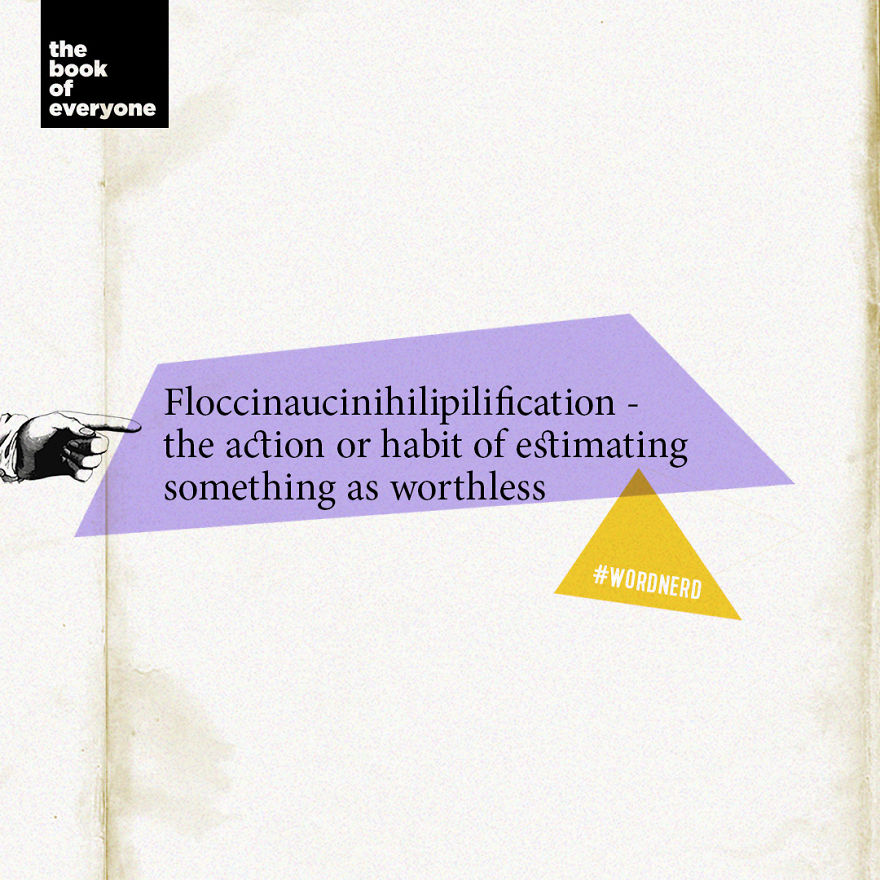
Report
Anyone can write on Bored Panda. Start writing!
Follow Bored Panda on Google News!
Follow
Author, Community member
Everyone deserves a book with their name on the cover.
Read more »

